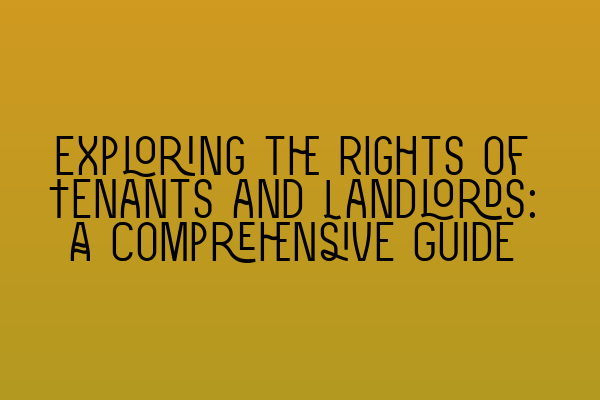Exploring the Rights of Tenants and Landlords: A Comprehensive Guide
Introduction:
Welcome to SQE Property Law & Land Law, where we are committed to providing insightful and comprehensive information on all aspects of property law. In this blog post, we will delve into the rights of tenants and landlords, shedding light on the key legal concepts and principles that underpin this dynamic relationship. Whether you are a tenant seeking to understand your rights or a landlord wanting to navigate the legal landscape, this guide will equip you with the knowledge you need to make informed decisions.
Importance of Understanding Tenant and Landlord Rights:
Understanding the rights and obligations of tenants and landlords is crucial for a successful and harmonious tenancy. It empowers both parties to protect their interests, avoid disputes, and ensure compliance with the law. Whether you are a prospective tenant looking for a new home or a landlord seeking to effectively manage your property, having a firm grasp of the rights and responsibilities involved will enable you to navigate the rental market with confidence.
Rights of Tenants:
1. Right to a Habitable Property:
As a tenant, one of your fundamental rights is the right to live in a habitable property. This means that your rented accommodation must meet basic health and safety standards, such as having functioning utilities, proper ventilation, and structural integrity. If your landlord fails to maintain the property in a habitable condition, you may have legal remedies available to seek redress.
2. Right to Exclusive Possession:
When you sign a tenancy agreement, you gain the right to exclusive possession of the property for the duration of the tenancy. This essentially means that the landlord cannot enter the property without your permission, except in certain circumstances outlined in the agreement or as permitted by law.
3. Right to Quiet Enjoyment:
Tenants have the right to quiet enjoyment of the rented property, which entails being able to live in peace, free from unnecessary disturbances or interference by the landlord. If the landlord violates this right by, for example, entering the property without notice or harassing the tenant, legal action may be taken to uphold the tenant’s rights.
4. Right to Privacy and Data Protection:
Tenants have a reasonable expectation of privacy within their rented property. Landlords must respect this right and not intrude on their tenants’ personal lives. Additionally, landlords have a duty to handle and protect any personal data collected during the tenancy in compliance with data protection laws.
Rights of Landlords:
1. Right to Rental Income:
Landlords have the right to receive the agreed-upon rental income from tenants. This includes timely payment of rent and other agreed-upon charges, such as utilities or maintenance fees. If a tenant fails to pay rent, landlords have procedures available to pursue arrears and possibly terminate the tenancy.
2. Right to Inspect the Property:
To protect their investment and ensure compliance with the terms of the tenancy agreement, landlords have the right to inspect the property. However, it is crucial to strike a balance between this right and the tenant’s right to privacy. Landlords must provide reasonable notice to tenants before conducting inspections, except in emergency situations.
3. Right to Proper Use and Care of the Property:
Landlords have the right to expect tenants to use and care for the property responsibly. Tenants have a responsibility to maintain the property in a reasonably clean and tidy condition and not cause damage beyond normal wear and tear. If tenants breach these obligations, landlords may have grounds to pursue legal action or deduct costs from the security deposit.
4. Right to End the Tenancy:
In certain circumstances, landlords have the right to end a tenancy, such as when the tenant breaches the terms of the agreement or engages in illegal activities on the property. However, it is essential to follow the proper legal procedures to avoid potential liability for wrongful eviction.
Conclusion:
By exploring the rights of tenants and landlords, we have provided a comprehensive guide to help you navigate the complex world of property law. Understanding these rights is crucial for tenants and landlords alike, as it empowers them to safeguard their interests and ensure compliance with legal obligations.
If you found this guide helpful, we recommend checking out our related articles for further information and resources:
– SQE 1 Practice Exam Questions
– SQE 1 Practice Mocks FLK1 FLK2
– SQE 2 Preparation Courses
– SQE 1 Preparation Courses
– SRA SQE Exam Dates
At SQE Property Law & Land Law, we are committed to providing expert legal advice and insights. For personalized legal assistance or to discuss your specific property matters, please contact our team of experienced solicitors today.
